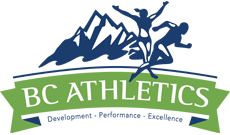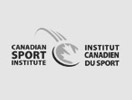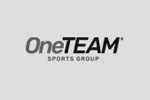Malindi Elmore: From JD to Olympian & Everything In Between
Malindi Elmore wears many hats…she’s a wife to Graham, mom of two boys, university coach, and now a two-time Olympian! Prior to her selection to the 2020ne Canadian Olympic Team we caught up with Malindi to chat about her journey as an athlete, coach, and parent. Malindi’s story is a reminder that anything is possible when we say yes to opportunities, know our priorities and stay curious about what is possible.
How did you get started in Athletics?
I started T&F through my elementary school in Grade 4 and was pretty much hooked right away. Although all the students do track & field as part of PE, only two per grade per event are selected to represent the school at the District Meet. I was one of the ones chosen to go and that experience was just amazing. You're getting to go run on the city track against other teams and wear your school t-shirt.
Interesting! My next question was going to be how you moved from school to club track & field.
 I have Mike van Tighem to thank. He was the head of the track club, lead organizer of the Jack Brow, and a high school coach. He would invite the winner of each event from the school meet to the Jack Brow and give them a complementary entry as a way to get more school kids into the club. I was invited in Grades 4 - 6 and frankly I got as nervous for that as I got for the Olympics. It was such a big deal, and I'm showing up without spikes, wearing soccer shorts, and running against club kids from across the province.
I have Mike van Tighem to thank. He was the head of the track club, lead organizer of the Jack Brow, and a high school coach. He would invite the winner of each event from the school meet to the Jack Brow and give them a complementary entry as a way to get more school kids into the club. I was invited in Grades 4 - 6 and frankly I got as nervous for that as I got for the Olympics. It was such a big deal, and I'm showing up without spikes, wearing soccer shorts, and running against club kids from across the province.
I didn't join the Kelowna Track & Field Club officially until Grade 8 and that was because Mike was so persistent and kept inviting me. My first few years I didn't train very much for track & field because I was really involved in other sports; I was playing on two soccer teams and a field hockey team. I would go to meets and come to practice when I could, but it wasn't my main sport and my parents wanted to ensure I was getting enough rest.
At what point did you become more serious about running as compared to the other sports you were playing?
Probably around Grade 10. By that point I had won the BC High School Championships in track and cross country and was making Team BC for Legion National Championships. I also made the Pan American Jr Team that year. It was starting to become clear that I was good at running. I was still playing select level soccer 5 or 6 days a week though, and our team was #1 in the province and went onto Nationals, so my soccer was still pretty serious.
I did start experiencing overuse injuries from doing both soccer and track at the same time at that level, often going from a soccer game to track practice or vice versa. I think it was Grade 11 or 12 when I had to stop playing soccer, mainly because of injuries. At that point also I’d had a taste of what I wanted to do which was run post-collegiately. Watching Leah Pells finish 4th at the 1996 Atlanta Olympics was such a motivator for me. Leah was a great mentor and a tangible role model; she would come up and run with our track club and come to our end of year club banquet. Seeing her performance helped me set my sights on the long-term goal of making an Olympic Team.
What was the transition like for you moving from high school to collegiate sport?
 It was a really hard transition. I went to Stanford University but because I had played so many team sports up to Grade 12 I was not doing the training load that a lot of other athletes, particularly in the US, would be doing at that stage. A lot of them run 8-10 times a week, and I was still on a 4 times a week plan. I immediately got into an injury cycle where I ended up with 4 stress fractures in my first 2 years that were the result of overtraining. That was really discouraging because you want to contribute to the team, not just be on the sidelines.
It was a really hard transition. I went to Stanford University but because I had played so many team sports up to Grade 12 I was not doing the training load that a lot of other athletes, particularly in the US, would be doing at that stage. A lot of them run 8-10 times a week, and I was still on a 4 times a week plan. I immediately got into an injury cycle where I ended up with 4 stress fractures in my first 2 years that were the result of overtraining. That was really discouraging because you want to contribute to the team, not just be on the sidelines.
My third year of university, I took a step back from running and went abroad for a semester to Paris. That was probably the best thing I could have done because I got back to running on my own terms. When I came for my final two years, I actually started running well for the first time since high school.
Often in the NCAA, the coach-athlete relationship can resemble that of an employer-employee. What was it like coming back from Paris and communicating with your coach the changes you needed in your training program?
I found it to be a very different relationship than I was accustomed. It may have changed but there wasn’t the level of autonomy and collaboration that is encouraged in the club system. I had to learn to self-advocate and not be afraid to ask questions. It’s hard at that age to advocate for yourself against people in positions of authority but I had to communicate that what works best for me was not necessarily what worked best for everyone else. At that point I couldn’t run 80-mile weeks, or even 60-mile weeks, so I had to do more cross training, get more rest; I could perform better doing less. That winter I finished 4th at the NCAA Championships so that helped prove to the coaches that what I was doing was working.
What was a highlight of your University athletic career?
In my last two races I set the school record in the 800m and the 1500m, which was cool because they had previously been held by Regina Jacobs who went onto be a multi-Olympian for the US. Also, in my last NCAAs I placed 8th which wasn’t as high as I wanted but it was the fastest final in history, so it was cool to be a part of that.
I really loved being in university. It was great to be part of a team and be part of that culture of excellence and to be inspired by so many student-athletes of the team. I think that was the most impactful part of my experience.
How did you maintain your running aspirations after you graduated?
I graduated in 2003 and I knew I wanted to continue running, and I also knew I wanted to move back to Canada. In my experience I’d seen that people who stayed in the US after university rarely came home. I moved to Calgary because I wanted Mike van Tighem to coach me again and he’d relocated there while I was at university. I also knew the only way I would be able to continue running is to continue being a student; it would be really hard to juggle a job and training, and you don’t have as much flexibility as you do as a student. So, I did my Masters in Environmental Design and decided at that point that I was really going to focus on becoming as good a runner as I could.
What was your experience qualifying for the 2004 Olympics?
That was a bit of a surprise because I dropped about 8 seconds in the 1500m over that year, where 4:10 was my PB in university, and 4:02 was my PB by June of 2004. I don’t think in the Fall I necessarily thought I would make the team. My mindset wasn’t that “I’m training for the Olympics as soon as I moved to Calgary” it was more so, “I’m training to be the best I can be, and I’m going to do everything I can to improve and see what I can do over the next year”. And I think that’s why I ran well, I didn’t have a finite goal that owned me, it was more about the process. So, I just ran. I ran free, I trained hard, and I raced with a fair amount of conviction and openness to outcomes.
 Back then you had to run two A standards and one B standard, or some combination like that. I did run an A standard of 4:04 at the Prefontaine Classic that spring so I went to Rome with the purpose of running fast, knowing I needed to run another A or B to ensure my selection eligibility. I finished the race and left the track and had no idea what the result was. It’s funny looking back because there weren’t instant results, I didn’t have a phone or a laptop, and there was no social media. It took maybe 1.5 hours before I got a copy of the results. I had to run faster than 4:07, so that was my goal and I ran 4:02 and was just flabbergasted. Then I had to make a collect call home from a phone booth at the hotel to call my parents and my coach because they couldn’t get results online.
Back then you had to run two A standards and one B standard, or some combination like that. I did run an A standard of 4:04 at the Prefontaine Classic that spring so I went to Rome with the purpose of running fast, knowing I needed to run another A or B to ensure my selection eligibility. I finished the race and left the track and had no idea what the result was. It’s funny looking back because there weren’t instant results, I didn’t have a phone or a laptop, and there was no social media. It took maybe 1.5 hours before I got a copy of the results. I had to run faster than 4:07, so that was my goal and I ran 4:02 and was just flabbergasted. Then I had to make a collect call home from a phone booth at the hotel to call my parents and my coach because they couldn’t get results online.
I went to Trials in Victoria. The race was actually set up for someone else to try and get standard because being in the Top 3 with Standard at Trials was part of the Olympics Selection process. So we had an unofficial rabbit, the race went out really fast and I won in 4:04. That was an amazing experience! I had won the Olympic Trials and my parents, coach and boyfriend (now husband) were all there. It really was one of those dream days.
I am loving this story! What was the rest of that year like? What was the Olympic experience?
Unfortunately, I think I kind of peaked mentally around Trials. I went back oversees to race a little more and I was just really flat. I was entered in the Zurich Golden League and was given a blue bib which someone explained was because I had the fastest seed time in the race. That totally freaked me out and I ended up finishing last. I also developed a sore throat which I thought was just because of all the smoking at the hotel but when I didn’t get over it for two weeks, I realized I had a cold going into our training camp before the Olympics.
I got to the Olympics it was super cool to be there, but I didn’t make it through the rounds and that was disappointing because with my times from that season I should have been able to progress. But I was just tired; I’d been going hard all year and I was just tapped out. It is also a pretty overwhelming experience. I remember walking out into the stadium when they brought us out onto the track and the sheer energy was like nothing I’d never experienced before. 100,000 people screaming, cameras flashing, bright lights, music. I remember running my race and shaking the whole time because it was so loud and stimulating and distracting. You’re used to going out and running your race with some spectators and some cheers but nothing on that level. I always hoped I could make it back; you almost need that experience to prepare.
I was really happy my parents were there. They had flown in that day and were on the start line of the 1500m and we got to enjoy the Olympic experience after my race. We watched other competitions and when to dinners at midnight in the Athens Squares which was pretty amazing. So, it was a pretty cool thing to be a part of, I was just disappointed with my actual results.
Can you tell me more about your career as a track & field athlete?
I continued to compete through 2012. I competed at the Commonwealth Games and a couple Pan American Games. I made the 2007 World Championships but developed a major stress fracture during training camp, to the point where I couldn’t walk. I was sent in for an MRI and the team doctor advised against my running, so I went home and worked my butt off for the next 8 months. I had A standard for the 2008 Olympic Games but wasn’t selected as I wasn’t able to achieve it a second time. That year Canada only sent one athlete for track events beyond 400m. It’s amazing now to see the depth in our distance program where we’re sending 3 people in almost every event. Thankfully Canada has changed their approach, I think it’s so much better just going by World Athletics qualifying procedures; it made it so much more stressful for us trying to meet the additional requirements.
When I graduated from my Masters program I worked parttime at Stantec, which was really amazing. They were super flexible, and they paid me a full-time salary even when I was travelling for competitions. I did that for a number of years as well as consulting, so I was working about 20 hours/week. For me, it was always good to have the balance between running and school or working. It was ideal.
I moved back to Kelowna in 2010; by then I was married to my husband Graham and we were tired of the Calgary winters. I continued running but retired in 2012. I won the Olympic Trials but missed the standard by less than 1 second and by then I felt like I was ready to move on and do other things.
What was retirement like? Did you find it to be an easy transition?
I’d been working for a number of years but at that point I had also quit my job and gone back to school to do a teaching degree at UBC Okanagan. I taught for a year then I had my first child. I didn’t go back to work after than because I wanted to be home with him. Then I got into triathlon and spent a couple years as a pro-triathlete.
Wait! When did you start triathlons?
A couple times towards the end of my track season I’d come home to Kelowna in the summer and just jump in a local triathlon, but I really started in 2015. I couldn’t run for 8 or 9 months after I had my son Charlie in 2014 so I just swam and biked a lot. At that point, my husband Graham was doing triathlons and I’d be going to races, cheering him on, and learning more about and becoming a fan of the sport. Then one day he entered me in a Half-Ironman in Victoria all “You have to try it”. I won the race which qualified me for my pro-card so I was able to race in the pro-division for the next couple years at half-Ironman and Ironman distances. Being able to run really helped but I’m terrible at swimming, just terrible. I worked at it and got mediocre.
Given how well things were going with triathlons, how did you end up transitioning back to just running?
It happened after I had my second son, Oliver, in 2017. Ironman training takes about 25 hours a week and I didn’t have the capacity or desire to essentially be a fulltime athlete with two little kids at home. My priority was my family. I was totally at peace with moving on and just being a soccer mom and a coach and had absolutely no aspirations to return to competitive sport.
 I was running with Graham one day in the Fall of 2018 and was clearly feeling pretty energetic because I joked “I should just do a Marathon for fun”! I had done a couple Ironmans were you do a Marathon at the end and that was terrible because you are 6 hours into a really hard day by the time you start the run. He said, “I’ll write you a training plan, I think you can be ready in 4 months.” So, he wrote me a training plan, and in January 2019 I did it. Honestly, we didn’t have any time goals or anything but I ran 2:32 which was 2.5 minutes off the Olympic standard. And even though the conditions weren’t great, I’d only started running 4 months before because I was post-partum, and I was still nursing a baby, it felt easy and comfortable. There were so many factors that made us think I could run faster. It really wasn’t until that point that it was on my radar to get back to this level.
I was running with Graham one day in the Fall of 2018 and was clearly feeling pretty energetic because I joked “I should just do a Marathon for fun”! I had done a couple Ironmans were you do a Marathon at the end and that was terrible because you are 6 hours into a really hard day by the time you start the run. He said, “I’ll write you a training plan, I think you can be ready in 4 months.” So, he wrote me a training plan, and in January 2019 I did it. Honestly, we didn’t have any time goals or anything but I ran 2:32 which was 2.5 minutes off the Olympic standard. And even though the conditions weren’t great, I’d only started running 4 months before because I was post-partum, and I was still nursing a baby, it felt easy and comfortable. There were so many factors that made us think I could run faster. It really wasn’t until that point that it was on my radar to get back to this level.
You went into that first Marathon as a bit of an experiment. Was the Olympics on your mind at that point?
Pretty much as soon as I finished that race. Graham & I were on cloud 9 and came up with a master plan. At that point I couldn’t wait to do another marathon and I initially wanted to do one in April, but we decided that the target should be the Scotiabank Toronto Waterfront Marathon in October because the winner with standard would be automatically selected to the Olympic team which we thought was a reasonable goal.
We started our marathon build in August and it was flawless; I was way exceeding anything I had done in my first build. Then 10 days out from the race my hamstring just went while I was out for a run. I immediately went to physio to see if it could be fixed in time for the race, but we couldn’t get it to come around. I pulled out of the race on Friday and the race was on Sunday, realizing that there was no way I could do a marathon in two days. It was disappointing because that had been the goal and I knew I was ready to execute a great race. Thankfully I only had to take 3 or 4 weeks off to rehab my hamstring, so we decided that I’d go back to Houston in January to do that race again. I hadn’t lost much fitness so I was able to just extend my build.
Running in Houston the second time was a completely different experience than the previous year. For one, I didn’t have a newborn along, but I was also in the elite race when I’d previously been in the age group race which resulted in my running the majority of the race solo. This time I settled into a rhythm right away and it felt really comfortable running with the lead pack. I knew about 10km in that I was going to have a great day, it was going so well and everything was feeling so comfortable. With about 2km left the pack had broken up and I remembered thinking to myself “You used to be a 1500m runner; you have to run this last mile hard!” I ended up sprinting from 4th into 3rd and finished only 2 seconds behind 2nd. We all finished really close like an actual race which was cool. My time was 2:24:50 so I knew right away that I’d hit standard but also set a new Canadian record.
A cool thing too was that there were a whole bunch of Canadian women who were there for the Half Marathon including Natasha Wodak, Emily Setlack, Kinsey Middleton, Rachel Cliff and they were all cheering for me over the last 100m and were there to give hugs and celebrate. It was quite a special moment.
Of course, about a month after that we started hearing about COVID? How were you affected by it?
That was really hard for everyone. I just remember being so anxious this time last year. That spring was so stressful and not just because of the Olympics; that was the last thing on my list. You’re thinking, “Is this going to kill everyone I know? Are we going to lose our jobs?” There was just so much uncertainty about what this actually meant to our lives. Also, my kids were home fulltime, so I was trying to homeschool them and keep them from getting into too much trouble. Running became a total after thought for me. I couldn’t train properly and got injured, likely from chronic stress. I’m usually not a stressful person but no one had ever dealt with something like this before.
Honestly, I was glad Olympics were postponed because I wasn’t in the headspace to do the training I needed to do. It really helped that by the time summer came around we started to understand more about the disease. And that couple month break helped refresh me and helped me get back to training. I believe one of the reasons I’ve been able to continue in sport for so long is that I’ve had a lot of these breaks through my career whether for pregnancy, injury, or retirement, so it’s kept my body from getting too worn out.
How are you feeling about potentially being named to your second Olympic team?
I’m a firm believer that I can only control what I can control. Things about my running that stressed me out when I was younger, I can’t dwell on anymore. I came back to running because I love to run, I love to compete, and I love to see what I can do and how good I can be. If I get to, going to the Olympics will be an absolute thrill and honour, especially after being away from it for so long. But I don’t let the other stuff impact me. If the Olympics don’t happen for whatever reason life goes on, and if I don’t get selected, I’ve done the best I can do to put myself in a position to be selected.
What is it like having your husband be one of your coaches?
It’s great! It feels like this is really a family project for us. I’m the one doing the running but we’re the ones making it happen. Graham is highly invested in my success, which is great because he also has to take on a lot more of the backend work at home, like making meals and looking after the kids when I go out for a long run even though it’s the end of his workday. He does a lot to make it happen and he has a very vested interest in making sure I’m well prepared. I would not be able to do it if he weren’t on board with this. Also, and I know this as a coach myself, you need a coach; someone to be objective and hold you accountable. He’s been in my life for 18 years and understands what I need for training.

How did you get started in coaching?
I’ve been coaching online for about 10 years. While I was an athlete and in between jobs it was a great way to be able to support myself and I loved connecting with people and helping them with their goals. After I retired in 2012, I took a year or two off where I didn’t want anything to do with track. But I gradually wanted to get back involved and began coaching with the Okanagan Athletics Club in 2014. Then last year I was hired by UBCO to coach their collegiate program which is a dream job!
For a lot of years I didn’t know that coaching could be a profession because within the club system it’s generally more volunteer based. I feel really lucky that I can have this position because it’s something that I love to do and it’s in my hometown, which is where I want to be and raise my family. It’s really fun to build the program here because we’re a pretty new program and although we’re a smaller school we have a lot of potential and can build something great.
Thank you Malindi!
Author: Sabrina Nettey - Introductory Programs Coordinator – RunJumpThrowWheel & Junior Development, BC Athletics








